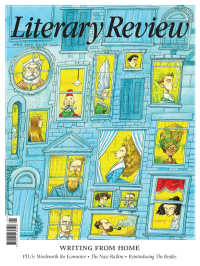Vybarr Cregan-Reid
Generation Plastic
Footprints: In Search of Future Fossils
By David Farrier
Fourth Estate 307pp £16.99
As far back as the mid-1980s, planning for the future stewardship of our nuclear waste was under way. But with language changing over time, how could warnings to ‘leave this plutonium-filled Pandora’s Box unopened’ be conveyed in such a way that would be understood in a thousand or a hundred thousand years? This is just one of the many problems aired in David Farrier’s Footprints, a book that asks what will survive of us – and the answer isn’t, as Philip Larkin put it, love.
Farrier races through the past and makes brief stops in the present before soaring into the deep future, all the while exploring our capacity as human beings to leave traces behind us. That is, if you can call the five trillion pieces of plastic floating in our oceans ‘traces’. Farrier’s stated goal is the hunt for the fossils of the future – this is really a book about the current state of the planet and our custody of it. It echoes many of the concerns of nature writers such as Kathleen Jamie, Katharine Norbury and Robert Macfarlane, but from a different coign of vantage. Farrier is less nature writer and more ‘smart thinker’, and in this well-intentioned, sometimes personal study he pieces together fragments of chemistry, biology, palaeoanthropology, nuclear physics, archaeology and so on.
Written with a poetic turn of phrase and an academic’s attention to detail, Footprints switches gears easily between discussions of Huttonian deep time, Eliot’s The Waste Land, Ovid, uranium, Auden and jellyfish. There are moments when the accretion of facts and statistics threatens to choke the book’s argument and the

Sign Up to our newsletter
Receive free articles, highlights from the archive, news, details of prizes, and much more.@Lit_Review
Follow Literary Review on Twitter
Twitter Feed
It wasn’t until 1825 that Pepys’s diary became available for the first time. How it was eventually decrypted and published is a story of subterfuge and duplicity.
Kate Loveman tells the tale.
Kate Loveman - Publishing Pepys
Kate Loveman: Publishing Pepys
literaryreview.co.uk
Arthur Christopher Benson was a pillar of the Edwardian establishment. He was supremely well connected. As his newly published diaries reveal, he was also riotously indiscreet.
Piers Brendon compares Benson’s journals to others from the 20th century.
Piers Brendon - Land of Dopes & Tories
Piers Brendon: Land of Dopes & Tories - The Benson Diaries: Selections from the Diary of Arthur Christopher Benson by Eamon Duffy & Ronald Hyam (edd)
literaryreview.co.uk
Of the siblings Gwen and Augustus John, it is Augustus who has commanded most attention from collectors and connoisseurs.
Was he really the finer artist, asks Tanya Harrod, or is it time Gwen emerged from her brother’s shadow?
Tanya Harrod - Cut from the Same Canvas
Tanya Harrod: Cut from the Same Canvas - Artists, Siblings, Visionaries: The Lives and Loves of Gwen and Augustus John by Judith Mackrell
literaryreview.co.uk